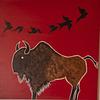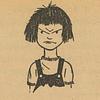You need to sign in or sign up before continuing.
Take a photo of a barcode or cover
Just so you don't think that I exclusively read kids and teen books, here is proof that I read a little bit of everything :)
I, for some reason, thought that this book was like a Native American version of American Gods. I really wanted to read that book. Instead what I got was a series of semi autobiographical short stories. Some really abstract, or surreal, some crushingly realistic. I have read his Absolutely True.. book and that book just crushed me to pieces, and I found parts of this book in that one. But when you are expecting a novel, and you are actually reading short stories you can imagine my surprise with the first three chapters.
This really isn't my thing, I could see reading this for a college class, or reading certain stories and discussing them and having to write responses to them for a class. I can see all that, I can't see picking this up for fun. Perhaps that is just me, I am friends with many people who have English degrees who might love this. But I think that outside an academic setting this book is just a little too abstract, you need a discussion and you need a prompt or three to help you get everything you can out of this book.
I did enjoy it, but I know that the way it was written it needs to be discussed and dissected, and since I didn't have anything like that for this book it only gets three stars.
I, for some reason, thought that this book was like a Native American version of American Gods. I really wanted to read that book. Instead what I got was a series of semi autobiographical short stories. Some really abstract, or surreal, some crushingly realistic. I have read his Absolutely True.. book and that book just crushed me to pieces, and I found parts of this book in that one. But when you are expecting a novel, and you are actually reading short stories you can imagine my surprise with the first three chapters.
This really isn't my thing, I could see reading this for a college class, or reading certain stories and discussing them and having to write responses to them for a class. I can see all that, I can't see picking this up for fun. Perhaps that is just me, I am friends with many people who have English degrees who might love this. But I think that outside an academic setting this book is just a little too abstract, you need a discussion and you need a prompt or three to help you get everything you can out of this book.
I did enjoy it, but I know that the way it was written it needs to be discussed and dissected, and since I didn't have anything like that for this book it only gets three stars.
After I had to read some chapters for an uni course, I continued diving into these tales about Native American experiences, history and present aspirations. I admire the author's capability to balance painful remembrance with humourous stories and traditional features of American indigeneity with universal truths. Changing voices and chronological leaps enrichen the reading experience and the possibility to recognize deeper meanings.
The language, the weaving in of history, the descriptions, oh! This was a tough read that I loved.
I've been pretty apathetic towards reading for a while, and I feel like this book has mostly gone over my head as I don't take time to analyze each story. Alexie paints a vivid picture of life on a reservation and I feel like I am better for reading this. I just hope I won't forget all of the stories inside.
Stand out story for me was "The Lone Ranger and Tonto Fistfight in Heaven" and I've read it over and over again. It's an amazing piece of writing that really brings up a sense of loneliness and feeling out of place, which is unfortunately much the tale of Native Americans and a major theme of this book.
Stand out story for me was "The Lone Ranger and Tonto Fistfight in Heaven" and I've read it over and over again. It's an amazing piece of writing that really brings up a sense of loneliness and feeling out of place, which is unfortunately much the tale of Native Americans and a major theme of this book.
I was totally surprised by how much I loved this book. I just finished it, and now I want to read it again, and I've never really felt like that before. The prose is so calm, but so much of it, I just want to read out loud to whoever is sitting closest to me. This book is a big deal.
This unusual collection of short stories are sad, magical, eye-opening, and read like poetry. Unique and addictive.
emotional
funny
medium-paced
Plot or Character Driven:
Character
Strong character development:
Yes
Loveable characters:
Complicated
Diverse cast of characters:
Yes
Flaws of characters a main focus:
Yes
A diverse group of short stories that provided some insight into Native American culture. However, I wish the stories had been as funny and memorable as their imaginative titles.
Up there with Carver's "Cathedral" as a collection... love it.
challenging
dark
emotional
reflective
tense
medium-paced
Plot or Character Driven:
Character
Strong character development:
Complicated
Loveable characters:
Complicated
Diverse cast of characters:
No
Flaws of characters a main focus:
Yes
By the end of the first short story, I was floored by Sherman Alexie's powerhouse writing. He sets dynamic scenes, tinged with tangible tension, characters who do surprising things for unsurprising reasons. The implications run deep: a whole community of people in a poverty-stricken reservation, many of whom rely on alcohol or are raised by parents who do (and thus the cycle continues);. Everything from the commodity cheese to the HUD houses points a finger at the powers that be that stripped the indigenous of their land and livelihood, a primal power slowly lost with each new generation that forgets how to make fry bread or "disappear" in the big cities. The disparity between those who never leave the "rez" versus the ones who make it out, only to be viewed as outcasts by their white counterparts and the Indians back home, is felt most acutely in the scenes and stories probably pulled from Alexie's own experiences. The writing is engaging and the stories brief enough to keep the level of raw sorrow and suffering being depicted somewhat digestible. In one story a character confesses, after hearing the worst thing her friend ever did, that if she were the drinking type she would get drunk specifically because of that story. Alexie, on the other hand, allows his readers the necessary space to read these stories without plunging into that same despair before arriving at the last page, all the while seeing for themselves why the characters in the book do. I am drawn to the magnetic pull of his writing and now want to read everything this man has written.








